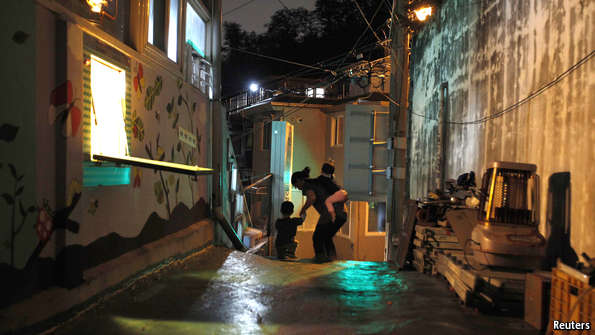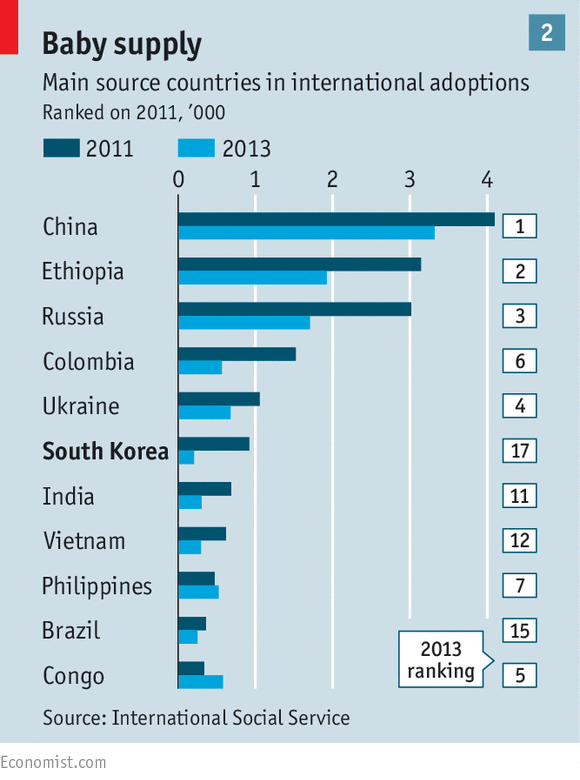
AT JUSARANG Community Church, in southern Seoul, a pastor maintains a “baby box” where mothers can leave unwanted infants (pictured above). Its intake is sadly rising. Since revisions were made to South Korea’s adoption law in 2012, the number it receives each month has risen from two to 20. The church says the chief reason for this upsurge is the revised law itself. Some babies are delivered with notes pinned to their chests to say their mothers did not want to register them, as the law now requires.
Adoptions in South Korea have had an unusually troubled history. After the end of the Korean war in 1953, biracial children who were the product of fleeting wartime unions between foreign servicemen and South Korean women in the 1950s were abandoned to drift in South Korea’s ravaged cities. The waifs—“dust of the streets” as they were called—were shunned by a Confucian society that prized bloodlines and could not countenance raising another’s child. Thousands of foreign homes began to take them in—probably the largest exodus of infants from a single country into adoption.
The outflow continued long after the Korean war. Since then South Korea has sent overseas around 200,000 of its orphaned or abandoned children, three-quarters of them to America. At the peak of the exodus, in the mid-1980s, 24 babies left their birth country every day to be taken into the care of foreigners. Adoption agencies raked in the fees. In 2001 government guidelines let them request $9,000 for an international adoption, compared with just $2,000 for a domestic one.
For many years the supply of babies was given a boost by the government’s now-abandoned emphasis on the need to limit births: families with more than two children were viewed as unpatriotic. Some chose to abandon unwanted babies at police stations or in markets. Now more than 90% of adopted babies are the children of unwed mothers, who fear being rejected by a socially conservative society. Poor single-parent families receive measly financial support from the state—only half the amount given to adoptive parents and foster homes. If they have wealthy relatives, they do not qualify for the country’s basic living allowance.
South Korea, however, now wants to show that it can look after all of its children. Since 2007 the country has set a quota for the number that can be sent overseas, lowering it by 10% a year. The children must also stay in South Korea for five months, while agencies look for a local home, before they can be sent abroad. The revisions to the adoption law in 2012 required that babies put up for adoption be registered in court. The aim was to make the process more transparent and improve adoptees’ chances of tracing their birth parents. In 2013 South Korea signed the Hague Adoption Convention, which says that children should preferably be adopted by families in their own country.
These steps were encouraged by lobby groups of South Korean-born adoptees who had grown up abroad, mostly in America. Some of their complaints, which included racial discrimination, were heard sympathetically by the government. one such group is Truth and Reconciliation for the Adoption Community of Korea (TRACK). It campaigns against international adoptions from South Korea and for the right of adoptees to find their birth parents. Even when agencies are willing to help, tracing biological parents can be difficult. TRACK says that is because adoption agencies mishandled records: registering children as orphans helped speed up state approval for adoption abroad.

The government’s efforts to stem the exodus have succeeded: international adoptions have dropped sharply (see chart). Babies now being adopted will have a much better chance of tracing their birth parents when they grow up. A week’s counselling required by the revised adoption law has encouraged some mothers to keep their infants.
But the revised law has had unintended results. Domestic adoptions, previously on the rise, have fallen since 2012, partly due to tighter eligibility requirements for adoptive parents, as well as a drop in the number of babies put up for adoption. At the same time police statistics show that the number of abandoned children has jumped, from 127 in 2011 to 225 in 2013.
One reason parents of unwanted babies often do not want to register them, is that potential employers can get access to family papers to gauge the suitability of candidates. Worse, relatives may see the records too. Parents often ostracise a daughter who has a child out of wedlock.

Taboos against adoption remain stubborn. Since the 1950s South Koreans have taken in only 4% of their orphaned children. Adoptions are often done secretly by parents who ensure that the baby’s blood type matches theirs; some women fake pregnancy to pretend the babies are their own. Girls are preferred over boys to avoid difficulty during ancestral family rites, which are traditionally carried out by sons. Since the 1950s more than four-fifths of abandoned children, or about 2m, have ended up being raised in state orphanages.
Little surprise, then, that more pregnancies are aborted in South Korea than in any other state in the OECD, a group of mostly rich countries. Until recent years, this was partly because of a Confucian preference for sons: female fetuses were frequently aborted. In 1990, 117 boys were being born for every 100 girls; for a family’s fourth child the ratio was 2:1. In 2012 the government briefly tried to crack down on the practice, invoking a law against abortion passed in 1953 that has been rarely enforced. Its aim was partly to boost the birth rate which, at fewer than 1.3 babies per woman, is among the world’s lowest.
Today the sex ratio at birth is much closer to normal. But abortions remain common, not least because of the social stigma of unwanted pregnancy. Lee Bong-chu of Seoul National University suspects that rates may have risen since the adoption law was changed. He says that by including so many restrictions, the law now gives “the wrong message” that adoption is bad.
The law’s perverse effects may be mitigated by a bill to limit access to family registers, which is expected to pass when the government puts it to parliament soon. Since last month children put up for adoption can also be registered in fathers’ records. This should help to ease some of the pressure on unwed mothers. But prejudice against them remains rife. That makes the revised adoption law a flawed one, as even some of its backers admit.